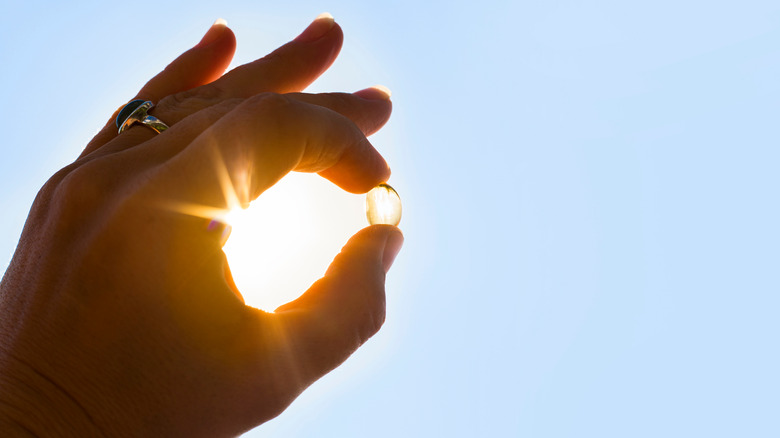Can Taking Vitamin D Help Reduce Anxiety?
Everyone has been anxious at some point, but some of us experience anxiety more frequently. Anxiety is a normal human feeling that can alert us to danger and make us more aware of our surroundings, according to the American Psychiatric Association. However, an estimated 30% of the adult population is believed to experience an anxiety disorder during their lifespan, thus making anxiety disorders one of the most common mental health conditions. There are several types of anxiety disorders, which include phobias, social anxiety disorder, separation anxiety disorder, panic disorder, and generalized anxiety disorder.
Luckily, there are many treatment options for anxiety disorders. Counseling and forms of psychotherapy are popular treatments for anxiety disorders, as is medication, per Mayo Clinic. When it comes to medication, there's an array of potential options that range from anti-anxiety and antidepressant options available by prescription to medications with sedating effects, like beta blockers and benzodiazepines. Often, talk therapy and medications are used in tandem to treat anxiety. Whether you're looking for a more holistic approach or if you want to explore additional ways to curb your anxiety, some of the vitamins and nutrients that are vital to our survival can help to alleviate symptoms of anxiety (via MedicalNewsToday). You may be surprised to learn just how beneficial naturally-derived nutrients can be, so here's what you need to know about one supplement in particular that can help reduce anxiety.
A vitamin with sunny benefits
Vitamin D is a fat-soluble vitamin that can decrease inflammation, as per the National Institutes of Health (NIH). Most commonly associated with sunlight since vitamin D production in our bodies is instigated by the process of synthesis that occurs when our skin is exposed to the sun's ultraviolet (UV) rays, vitamin D can also be derived from food and supplement tablets. Vitamin D aids in brain health and mood regulation, reports MedicalNewsToday. The latter benefit is associated with the role vitamin D can potentially play in reducing depression and elevating mood.
But how does vitamin D easing symptoms of depression relate to anxiety? The American Journal of Psychiatry says comorbidity of depression and anxiety is extremely frequent, meaning that it's highly common for a person to be diagnosed with both depression and anxiety simultaneously. When comorbid, anxiety and depression can create a cycle, in which the symptoms of each respective disorder exacerbate the other (per Hartgrove Behavioral Health System). For example, the fear experienced by an anxiety disorder may lead to depression, and feelings of depression may worsen anxiety. To make the cycle worse, having vitamin D deficiency can result in anxiety, mood changes, and feelings of hopelessness (via WebMD). When not comorbid with depression, vitamin D can still attenuate anxiety. A 2019 study published in Metabolic Brain Disease found that taking vitamin D supplements improved the symptoms of generalized anxiety disorder. Assuaging anxiety with vitamin D is definitely something to feel sunny about.


